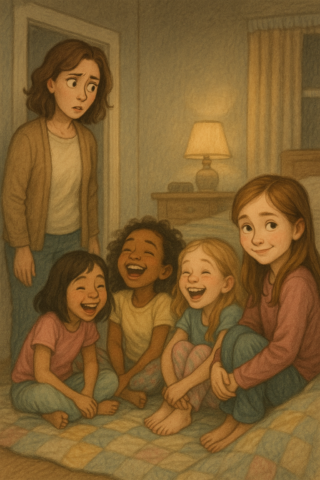We all have those stories from childhood—the wild, funny, sometimes embarrassing moments that shaped us. They’re more than just anecdotes; they’re a part of our identity. So when someone else takes your story and uses it for their own gain, the sting cuts deeper than you expect. That’s what happened to me the night I realized my own sister, Julia, had borrowed my childhood story to impress her new group of friends.
It was a Saturday night, and Julia had invited me to a dinner party at her apartment. She’d moved into the city a few months ago and was eager for me to meet her circle: a stylish, accomplished group of artists, musicians, and “creatives.” I was a little nervous, but also proud of Julia for building her own world.
The evening was fun at first—good food, laughter, wine. Then the conversation turned to childhood adventures. Someone shared a tale of getting lost at a carnival. Another chimed in about a failed science experiment that turned their parents’ kitchen blue.
And then, suddenly, I heard Julia’s voice rise:
“Oh, you think that’s wild? When I was eight, I snuck into the neighbor’s backyard to rescue a baby bird. I climbed a tree, fell right into their pool, and ended up making friends with their grumpy old dog—all before my parents even woke up!”

Her friends burst out laughing, showering Julia with admiration: “That’s incredible!” “You were so brave!” “I would have been terrified!”
I just sat there, frozen. Because that was my story. My memory. I’d told Julia that tale dozens of times growing up, proud and a little embarrassed by my impulsiveness and the scraped knees I got in the process. Julia? She was away at camp that week.
The Quiet Ache of Being Erased
As the laughter faded, Julia caught my eye, offering a small, apologetic shrug. No one else seemed to notice, but my cheeks burned with embarrassment. I wanted to say something, to claim my own story, but I didn’t want to cause a scene in front of her friends. Instead, I picked at my food and smiled tightly as the night went on.
After the party, as we loaded dishes in the kitchen, I finally spoke up. “Why did you tell my story like it was yours?”
Julia’s face fell. “I’m sorry. Everyone was sharing crazy stories, and I just blanked. I wanted to fit in. Yours is so much better than mine. I didn’t think you’d mind.”
I took a deep breath, trying to find compassion. “I get wanting to fit in. But those memories are part of who I am. It felt like you erased me in front of people who don’t know me at all.”
She nodded, regretful. “You’re right. I shouldn’t have done that. Next time, I’ll make sure I give you credit—or better yet, just tell my own stories.”
What I Learned
It’s easy for loved ones to cross boundaries without meaning to, especially when they’re seeking acceptance or trying to impress others. But our stories matter—because they remind us, and others, who we really are. I learned that it’s okay to stand up for your memories and to ask for respect, even from those closest to you.
Julia apologized again, and in time, we laughed about how she’ll have to embellish her own tales in the future. The moment made us both a little more careful about where we draw the line between sharing and taking.
Final Thought
If someone uses your story to impress others, don’t be afraid to claim it back. Your past is yours, and it deserves to be honored—even when the spotlight feels far away. The best connections come from authenticity, not borrowed bravado.


